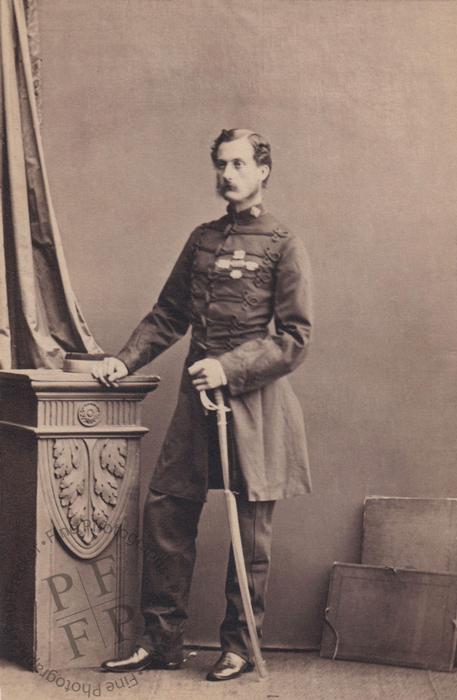Major William Stirling
(1835-1906)
22 September 1861
Volume 5, page 86, sitting number 5846.
Identified as 'Major Sinling, R.A.' in the Silvy daybooks, this is Major William Stirling of the Royal Artillery, later General Sir William Stirling.
Born on 4 August 1835, William Stirling was the third son among the twelve children of Charles Stirling of Muiravonside, Falkirk.
Educated at Edinburgh Academy and the Royal Military Academy in Woolwich, he joined the Royal Artillery in 1853 and first saw action during the Crimean War when he was 19 years old. He was present at the Battle of Alma, at the Battle of Balaclava and at the Battle of Inkerman, as well as the Siege of Sevastopol. He afterwards took part in the suppression of the Indian Mutiny. He took part in the expedition to China during the Second Opium War in 1860 and saw action again during the Second Anglo-Afghan War in 1878-1879.
In 1890 he was appointed Governor of the Royal Military Academy in Woolwich. In 1893 he was made a Knight Commander of the Order of the Bath. From 1900 to 1902 he was Lieutenant of the Tower of London and he was promoted full general on 5 January 1902. He retired from the Army later that year.
General Sir William Stirling died, aged 70, on 1 April 1906 at his home in Folkestone. According to his obituary in The Scotsman (13 April l906): ‘In Church work and the amelioration of the condition of the poor, Sir William took a deep and enthusiastic interest. Indeed, he was an evangelical of a pronounced type, and often read the lessons at the unattached Church of Emanuel, Folkestone. His delight also was to take part in services where poor persons assembled, and he readily gave his name and influence to all good objects that came before him. Sir William was twice married, and for the last few years had resided at Ochiltree, Folkestone.’

